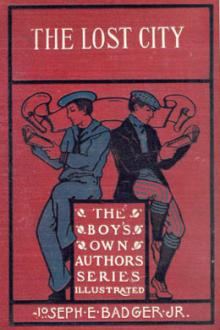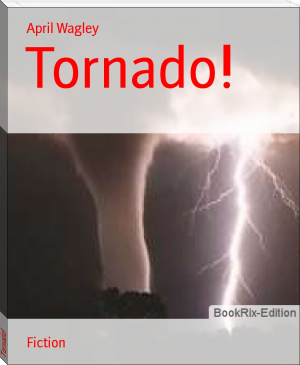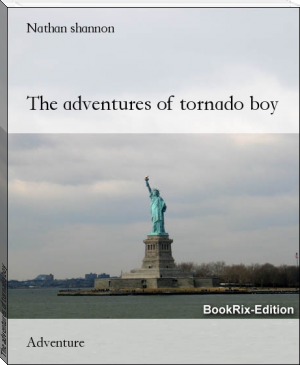The Lost City - Jr. Joseph E. Badger (children's books read aloud txt) 📗

- Author: Jr. Joseph E. Badger
- Performer: -
Book online «The Lost City - Jr. Joseph E. Badger (children's books read aloud txt) 📗». Author Jr. Joseph E. Badger
of catching and drying vast quantities of fish, doubtless to be
used during the winter.
“As a general thing they pitch their camp on the other side, over
towards the northeast; but small parties are pretty sure to rove
far and wide, coming around this way quite as often as not.”
“And their garb,—the weapons they bore?” asked the professor.
Edgecombe motioned towards those articles in which such a lively
interest had been awakened, then said that, while few of the red
men who had come beneath his near observation had been so
elaborately equipped, he had taken notice of similar weapons and
garments, with additions which he strove hard to describe with
accuracy.
Nearly every sentence which crossed his lips served to confirm
the marvellous truth which had so dazzlingly burst upon the
professor’s eager brain, and with a glib tongue he named each
weapon, each garment, as accurately as ever set down in ancient
history, not a little to the wide-eyed amazement of Waldo
Gillespie.
“Worse than those blessed ‘sour-us’ and cousins,” he confided to
his brother, in a whisper. “Reckon it’s all right, Bruno? Uncle
isn’t—eh?”
But uncle Phaeton paid them no attention, so deeply was he
stirred by this wondrous revelation. He felt that he was upon
the verge of a discovery which would startle the wide world as no
recent announcement had been able to do, unless—but it surely
must be correct!
And then, when Cooper Edgecombe finished all he could tell
concerning those queerly armed and gaudily garbed red men, the
professor let loose his tongue, telling what glorious hopes and
dazzling anticipations were now within him.
“For hundreds upon hundreds of years there have been wild, weird
legends about the Lost City, but that merely meant a mass of
wondrous ruins, long since overwhelmed by shifting sands,
somewhere in the heart of the great American desert, so-called.
“By some it was claimed that this ancient city owed its primal
existence to a fragment of the Aztecs, driven from their native
quarters in Old Mexico. By others ‘twas attributed unto one of
the fabulous ‘Lost Tribes of Israel,’ but even the most
enthusiastic never for one moment dreamed of—this!”
“Except yourself, uncle Phaeton,” cut in Waldo, with a subdued
grin. “This must be one of the marvels you calculated on
discovering, thanks to the flying-machine, eh?”
“Nay, my boy; I never let my imagination soar half so high as all
that,” quickly answered the professor. “But now—now I feel
confident that just such a discovery lies before us, and with the
dawn of a new day we will ascend and look for the glorious ‘Lost
City of the Aztecs!’ “
Again the savant sprang to his feet, wildly gesticulating as he
strode to and fro, striving to thus work off some of the intense
excitement which had taken full possession. And words fell
rapidly from his lips the while, only a portion of which need be
placed upon record in this connection, however.
“A fico for the paltry lost cities of musty tradition, now! They
may sleep beneath the sand-storms of countless years, but this—I
would gladly give one of my eyes for the certainty that its mate
might gaze upon such a wondrous spectacle as—Oh, if it might
only prove true! If I might only discover such a stupendous
treasure! Aztecs! And in the present day! Alive—armed and
garbed as of yore! Amazing! Incredible! Astounding beyond the
wildest dreams of a confirmed—”
With startling swiftness uncle Phaeton wheeled to confront the
exile, gripping his arm with fierce vigour, as he shrilly
demanded:
“Opium—are you an eater of drugs, Cooper Edgecombe?”
Even as the words crossed his lips, the professor realised how
preposterous they must sound, but the exile shook his head,
earnestly.
“I never ate drugs in that shape, sir. Even if I had been
addicted to morphine and the like, how could I indulge the
appetite here, in these gloomy, lonely wilds?”
“I beg your pardon, sir; most humbly I implore your forgiveness.
I have but one excuse—this wondrous—Good night! I’m going to
bed before I add to my new reputation as—a blessed idiot, no
less!”
CHAPTER XIV.
A MARVELLOUS VISION.
But the night was considerably older ere any one of that
quartette lost himself in slumber, for all had been too
thoroughly wrought up by the exciting events of the past day for
sleep to claim an easy subject.
By common consent, however, that one particular subject was
barred for the present, and then, sitting in a cosy group about
the glowing fire there in the cavern, the recently formed friends
talked and chatted, asking and answering questions almost past
counting.
Little wonder that such should be the case, so far as Cooper
Edgecombe was concerned, since he had been lost to the busy world
and its many changes for a long decade.
Then, too, his own dreary existence held a strange charm for the
air-voyagers, and the exile grew wonderfully cheerful and
bright-eyed as he in part depicted his struggles to sustain life
against such heavy odds, and still strove to keep alive that one
hope,—that even yet he might be able to discover a clew to his
loved and lost ones.
“Not alive; I have long since abandoned that faint hope. But if
I might only find something to make sure, something that I could
pray over, then bury where my heart could hover above—”
“You are still alive, good friend, yet you have spent long years
out here in the wilderness,” gently suggested the professor.
Edgecombe flinched, as one might when a rude hand touches a still
raw wound.
“But they, my wife, my baby girl,—they could never have lived as
I have existed. They surely must have perished; if not at once,
then when the first cruel storms of hideous winter came howling
down from the far north!”
“Unless they were found and rescued by—who knows, my good sir?”
forcing a cheerful smile, which, unfortunately, was only
surface-born, as the exile lifted his head with a start and a
gasping ejaculation. “Since it seems fairly well proven that
this supposedly unknown land is actually inhabited, why may your
loved ones not have been rescued?”
“The Indians? You mean by the Aztecs, sir?”
“If Aztecans they should really prove; why not?”
“But, surely I have heard—sacrifices?” huskily breathed the
greatly agitated man, while the professor, realising how he was
making a bad matter worse, brazenly falsified the records,
declaring that no human sacrifices had ever stained the record of
that noble, honourable, gallant race; and then changed the
subject as quickly as might be.
Nevertheless, there was one good effect following that talk.
Cooper Edgecombe had dreaded nothing so much as the fear of being
left behind by these, the first white people he had seen for what
seemed more than an ordinary lifetime; but now, when the
professor hinted at a longing to take a spin through ether, for
the purpose of winning a wider view, he eagerly seconded that
idea, even while realising that it would be difficult to take him
along with the rest.
Still, nothing was definitely settled that evening, and at a
fairly respectable hour before the turn of night, the
air-voyagers were wrapped in their blankets and soundly
slumbering.
Not so the exile. Sleep was far from his brain, and while he
really knew that danger could hardly menace that wondrous bit of
ingenious mechanism, he watched it throughout that long night,
ready to risk his own life in its defence should the occasion
arise.
Why not, since his whole future depended upon the aeromotor? By
its aid he hoped to reach civilization once more; and in spite of
the great loss which had wrecked his life, he was thrilled to the
centre by that glorious prospect. Here he was dead while
breathing; there he would at least be in touch with his fellow
men once more!
An early meal was prepared by the exile, and in readiness when
his trio of guests awakened to the new day; and then, while
busily discussing the really appetising viands placed before
them, the next move was fully determined upon.
Not a little to his secret delight, the professor heard Edgecombe
broach the subject of further explorations, and seeing that his
excitement had passed away in goodly measure during the silent
watches of the night, he talked with greater freedom.
“Of course we’ll keep in touch with you, here, friend, and take
no decisive move without your knowledge and consent. Our fate
shall be yours, and your fate shall be ours. Only—I would
dearly love to catch a glimpse of—If there should actually be a
Lost City in existence!”
“If there is, as there surely must be one of some description,
judging from the number of red men I have seen collecting here at
the lake,” observed the exile, “you certainly ought to make the
discovery with the aid of your air-ship. You can ascend at will,
of course, sir?”
Nothing loath, the professor spoke of his pet and its wondrous
capabilities, and then all hands left the cavern for the outer
air, to prepare for action.
As a further assurance, uncle Phaeton begged Edgecombe to enter
the aerostat, then skilfully caused the vessel to float upward
into clear space, sailing out over the lake even to the whirlpool
itself before turning, his passenger eagerly watching every move
and touch of hand, asking questions which proved him both shrewd
and ingenious, from a mechanical point of view.
Returning to their starting-point, Edgecombe sprang lightly to
earth to make way for the brothers, face ruddy and eyes aglow as
he again begged them all to keep watch for aught which might
solve the mystery yet surrounding the fate of his loved ones.
The promise was given, together with an earnest assurance that
they would soon return; then the parting was cut as short as
might be, all feeling that such a course was wisest and kindest,
after all.
For an hour or more the air-ship sped on, high in air, its
inmates viewing the various and varying landmarks beneath and
beyond them, all marvelling at the fact that such an immense
scope of country should for so long be left in its native
virginity, especially where all are so land-hungry.
Then, as nothing of especial interest was brought to their
notice, uncle Phaeton quite naturally reverted to that suit of
Aztecan armour, and the glorious possibilities which the words of
the exile had opened up to them as explorers.
Bruno listened with unfeigned interest, but not so his more
mercurial brother, who took advantage of an opening left by the
professor, to bluntly interject:
“What mighty good, even if you should find it all, uncle Phaeton?
You couldn’t pick it up and tote it away, to start a dime museum
with. And, as for my part,—I’ll tell you what! If we could
only find something like Aladdin’s cave, now!”
“Growing miserly in your old age, are you, lad?” mocked his
uncle.
“No; I don’t mean just that. His trees were hung with riches,
but mine should be—crammed and crowded full of plum pudding,
fruit cake, angel food, mince pies, and the like! Yes, and there
should be fountains of lemonade! And mountains of ice-cream!
And sandbars of caramels, and chocolate drops, and trilbies,
and—well, now, what’s the matter with you fellows, anyway?”
He spoke with boyish indignation at that laughing outbreak, but
the kindly professor quickly managed to smooth the matter over,
although not before Waldo had promised Bruno a sound thumping the
first time they set





Comments (0)